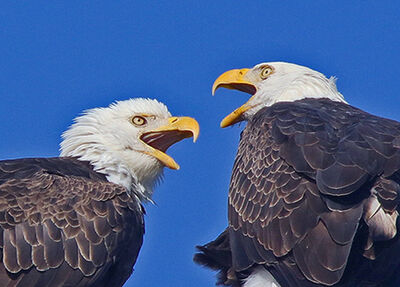Full Frame versus APS-C digital sensors
Jan 25, 2019 17:45:45 #
Kiron
Loc: Wales and Florida
I am relatively new to digital photography beyond "Point and Shoot" and am looking to buy something modern and more versatile. Perhaps one of the members would care to explain the difference between Full Frame versus APS-C, as in Full Frame sensor and Crop sensor.
Jan 25, 2019 17:59:15 #
gopher22 wrote:
I am relatively new to digital photography beyond "Point and Shoot" and am looking to buy something modern and more versatile. Perhaps one of the members would care to explain the difference between Full Frame versus APS-C, as in Full Frame sensor and Crop sensor.
Size...
https://theonlinephotographer.typepad.com/the_online_photographer/2016/01/camera-sensor-size.html
Each of the larger formats from Micro 4/3 to medium format digital has a role to play in the photographic universe. None is intrinsically better at everything than another one. They, and all the cameras that use them, each have their niche markets.
Life is full of little trade-offs. You learn to maximize what you need and minimize what you don't. Sometimes, less is more. Sometimes, more is more. Sometimes, less is less...
The sweet spot for price vs performance is often APS-C, simply because it's the best-selling category.
The sweet spot for portability with decent performance is Micro 4/3, because a SYSTEM of body and several lenses saves 2/3 to 3/4 the weight over a full frame system. But you give up two stops of ISO in dim light...
The sweet spot for image technical quality is full frame. The lenses suck in twice as much light as APS-C, and four times as much light as Micro 4/3. So noise is less intrusive at high ISOs. But full frame gear can cost a LOT more than APS-C or Micro 4/3. And it can weigh a lot more, and take up more space.
You have to take a look at what YOU photograph, or want to photograph, and then find the best compromise for that subject matter that also meets your budget constraints.
Jan 25, 2019 18:28:22 #
If you're concerned about what others might think your camera says about you, consider these ideas regarding full-frame: https://www.uglyhedgehog.com/t-569677-1.html


Jan 25, 2019 19:02:16 #
CHG_CANON wrote:
If you're concerned about what others might think your camera says about you, consider these ideas regarding full-frame: https://www.uglyhedgehog.com/t-569677-1.html


It was great in December. It’s still great.
Andy
Jan 25, 2019 19:41:11 #
Jan 25, 2019 20:13:29 #
gopher22 wrote:
I am relatively new to digital photography beyond "Point and
Shoot" and am looking to buy something modern and more
versatile. Perhaps one of the members would care to explain
the difference between Full Frame versus APS-C, as in Full
Frame sensor and Crop sensor.
I am relatively new to digital photography beyond "Point and
Shoot" and am looking to buy something modern and more
versatile. Perhaps one of the members would care to explain
the difference between Full Frame versus APS-C, as in Full
Frame sensor and Crop sensor.
As the forum responses will all prove, you shouldn't
worry about this. It's very subjective so you should
just buy whatever appeals to you and your wallet.
I realize that "whatever appeals to you" leads to
needing to know a bit about functions and maybe
ergonomics, so you need a shop where you can put
your hands around the camera, like BestBuy rather
than blind buying online.
As to your exact question, re: format size, common
sense tells you not to spend extra for any supposed
benefits you can't imagine a need for. Sooooo ... as
to format size, it's doubtful you'll start out with the
bigger more expensive format, despite haranguing
by the 'bigger is better' evangelists.
.
Jan 25, 2019 21:22:38 #
The advantage of full frame FX sensor is a wider angle of view with the same lens compared to a DX crop frame sensor. For example, to get the equivalent of a full frame horizontal view, you would need to combine two vertical shots with a crop sensor camera.
The advantage of crop sensor is a longer equivalent focal length. For example a 300mm lens on a full frame camera gives a 300mm focal length, but on a crop sensor camera it gives an equivalent focal length of 450mm. On a 1" CX sensor camera the 300mm lens gives an equivalent focal length of 810mm.
The advantage of crop sensor is a longer equivalent focal length. For example a 300mm lens on a full frame camera gives a 300mm focal length, but on a crop sensor camera it gives an equivalent focal length of 450mm. On a 1" CX sensor camera the 300mm lens gives an equivalent focal length of 810mm.
Jan 25, 2019 21:29:52 #
burkphoto wrote:
Size... br br https://theonlinephotographer.type... (show quote)
Very, very WELL explained !

Jan 25, 2019 23:11:53 #
`
Here's the nontech deal.
Buying into FF is expensive, your kit is
kinda large, and the potential for finest
image quality is guaranteed. Note that
word "potential". Problem is that image
quality is the only possible benefit and
so you wind up always seeking more
megapixels and fancy lenses. Big $$$,
big bulky gear. All for seeking max IQ.
Buying into APSC reduces expense and
bulk, but not by very much, and some
of the finer APSC bodies are about the
same size as FF. Still, APSC is usually a
bit smaller and somewhat cheaper.
You didn't ask about m4/3 but since it
has already been brought up, I'd say
it's the best answer the the FF vs APSC
conundrum. Sensor size is only slightly
smaller than for APSC ... the step down
from FF to APSC is a 1.5X crop, but the
step down from APSC to m4/3 is just a
1.2X crop.
m4/3 gear is endearingly compact, very
affordable, and unlike APSC, it's not a
"compromise format" vs FF. Going with
m4/3 is UNcompromising. With m4/3
you've set a very definite priority: SIZE.
Image quality is excellent but someone
using a 50MP FF can always prove that
m4/3 is not the ultimate. Yup, you have
to settle for excellent. OTOH, compare
a 2-lens m4/3 kit to an equivalent FF
kit as to bulk, weight and cost. A sane
person will "settle" for excellent and let
the nonsane users seek the ultimate :-)
.
Here's the nontech deal.
Buying into FF is expensive, your kit is
kinda large, and the potential for finest
image quality is guaranteed. Note that
word "potential". Problem is that image
quality is the only possible benefit and
so you wind up always seeking more
megapixels and fancy lenses. Big $$$,
big bulky gear. All for seeking max IQ.
Buying into APSC reduces expense and
bulk, but not by very much, and some
of the finer APSC bodies are about the
same size as FF. Still, APSC is usually a
bit smaller and somewhat cheaper.
You didn't ask about m4/3 but since it
has already been brought up, I'd say
it's the best answer the the FF vs APSC
conundrum. Sensor size is only slightly
smaller than for APSC ... the step down
from FF to APSC is a 1.5X crop, but the
step down from APSC to m4/3 is just a
1.2X crop.
m4/3 gear is endearingly compact, very
affordable, and unlike APSC, it's not a
"compromise format" vs FF. Going with
m4/3 is UNcompromising. With m4/3
you've set a very definite priority: SIZE.
Image quality is excellent but someone
using a 50MP FF can always prove that
m4/3 is not the ultimate. Yup, you have
to settle for excellent. OTOH, compare
a 2-lens m4/3 kit to an equivalent FF
kit as to bulk, weight and cost. A sane
person will "settle" for excellent and let
the nonsane users seek the ultimate :-)
.
Jan 26, 2019 04:49:47 #
gopher22 wrote:
I am relatively new to digital photography beyond "Point and Shoot" and am looking to buy something modern and more versatile. Perhaps one of the members would care to explain the difference between Full Frame versus APS-C, as in Full Frame sensor and Crop sensor.
Chihuahus or Pekingese--which makes a better guard dog?
Which is more "modern" and "versatile"?
Enquiring minds want to know.

Jan 26, 2019 06:14:15 #
gopher22 wrote:
I am relatively new to digital photography beyond "Point and Shoot" and am looking to buy something modern and more versatile. Perhaps one of the members would care to explain the difference between Full Frame versus APS-C, as in Full Frame sensor and Crop sensor.
A little different explanation of sensor sizes:
https://www.youtube.com/watch?v=LxZe4MuM8_Q
Here's some more full frame entertainment for you:
https://www.youtube.com/watch?v=li94wfBJuVQ
Jan 26, 2019 06:22:53 #
If you are new in photography all technical data can confuse you a lot. Generally the greater the sensor a more technical quality the picture. But you can have more or less the same results with an APS-C than with a FF. APS-C are cheaper, less bulky and have lots of lenses. More important than the sensor is to buy good lenses. I prefer an APS-C with a top quality lens than a FF with a cheap one.
Jan 26, 2019 06:57:34 #
burkphoto wrote:
Size... br br https://theonlinephotographer.type... (show quote)
Nicely done. I was going to respond but no need. Books are written on the topic. This is an efficient primer :-)
Jan 26, 2019 07:42:02 #
Buy the very best you can afford and learn to use it to it full capacity. I used a crop sensor, canon 7 d II, for my birding photos and everything else to, what I see in my visor is wat I see in my picture and that what mather to me period
Jan 26, 2019 07:46:13 #
It really depends on what you plan to shoot. I have had all the major formats full, crop, and micro 4/3.
Full was nice but lens were very heavy for birding and less range, micro 4/3 were light lens but loss of light and focus were killing my wildlife photography. Crop sensor seems to be best for me focus is good light seems only a stop less then full frame but heavier then micro 4/3. So my advice is think of what you shoot most if its sports or low light get a full or crop. Everything else a mirror 4/3 will work.
Full was nice but lens were very heavy for birding and less range, micro 4/3 were light lens but loss of light and focus were killing my wildlife photography. Crop sensor seems to be best for me focus is good light seems only a stop less then full frame but heavier then micro 4/3. So my advice is think of what you shoot most if its sports or low light get a full or crop. Everything else a mirror 4/3 will work.
If you want to reply, then register here. Registration is free and your account is created instantly, so you can post right away.









